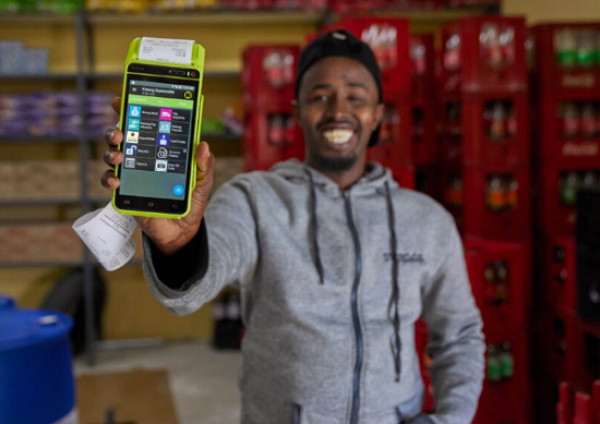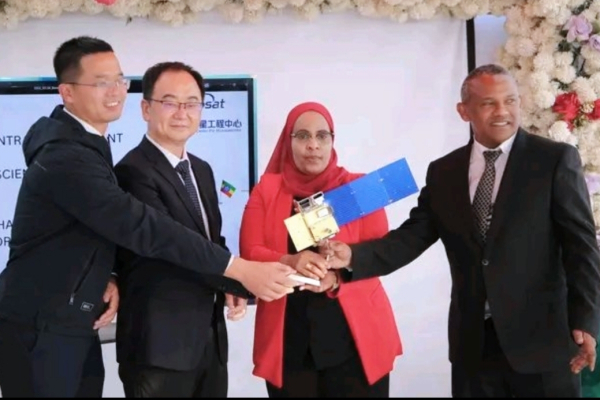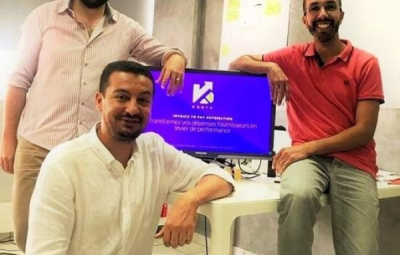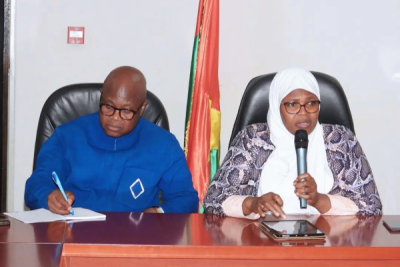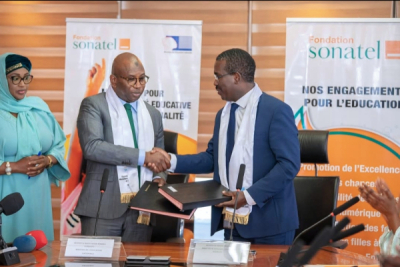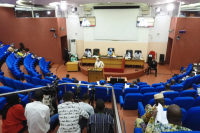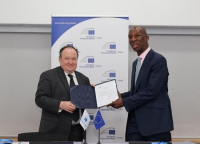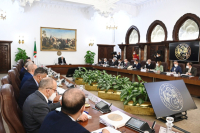In South Africa, Kazang is establishing itself as a key driver for modernizing payments and improving the fluidity of commercial transactions while strengthening the financial autonomy of small businesses.
Kazang is a fintech solution developed by a South African startup, offering a mobile application that enables users to conduct various transactions, including bill payments, airtime purchases, money transfers, and digital service top-ups.
Led by Martin Wright, the Cape Town-based startup aims to address the needs of both shop owners and their communities. "We understand the unique needs of both shop owners and the vibrant communities they serve, and we are here to bridge the gap with innovative solutions.We provide shop owners with a single handheld device that opens doors to new revenue streams and transforms their shops into hubs of opportunity," the company states on its LinkedIn page.
The Kazang solution features a mobile application available on iOS and Android, with over 100,000 downloads. Users create an account using a valid South African phone number and complete registration through customer service. They can then fund their Kazang wallet via local bank transfers or instant transfers.
Designed to operate in areas with limited banking infrastructure, Kazang facilitates electronic transactions, reducing reliance on cash and securing payments. This allows small merchants to diversify their revenue streams.
Kazang also operates in Namibia, Botswana, and Zambia, extending its fintech solutions across Southern Africa.
By Adoni Conrad Quenum,
Editing by Feriol Bewa
Ethiopian authorities aim to accelerate the development of the national space sector and harness it for socio-economic growth. The plan includes orbiting ten satellites by 2035.
Ethiopia plans to launch its third Earth observation satellite, the Ethiopian Remote Sensing Satellite-2 (ETRSS-2), in 2026, the Ethiopian Space Science and Geospatial Institute (ESSGI) said this week.
Developed in partnership with China, the new satellite will have a five-year lifespan and a resolution of 0.5 meters, the ESSGI said. It is expected to provide high-resolution imagery and enhanced monitoring capabilities compared to its predecessors, ETRSS-1 and ET-SMART-RSS, which were launched in December 2019 and December 2020, respectively.
The initiative is part of Ethiopia's national space policy, launched in December 2018, the institute said. The roadmap reflects the government's ambition to leverage space technologies to address the country’s socio-economic challenges. The government plans to launch ten new satellites by 2035.
Once operational, ETRSS-2 could facilitate decision-making in several sectors, including agriculture, by providing accurate data, the ESSGI said. The United Nations Office for Outer Space Affairs (UNOOSA) considers space technology a key catalyst in the agricultural sector.
"Satellite imagery, global navigation satellite systems data and their integrated applications are now critical tools for agriculture, enabling stakeholders, ranging from local farmers to international policymakers, to monitor crop health, manage water resources, detect and control pests, and plan for weather uncertainties, among various other applications," according to the report "Leverage Space Technology for Agricultural Development and Food Security," published in January 2025 by UNOOSA.
By Isaac K. Kassouwi,
Editing by Sèna D. B. de Sodji
While financial inclusion remains a challenge in Africa, this Moroccan startup offers a solution tailored to small businesses. It positions itself as an effective alternative to optimize their financial management.
Konta is a fintech solution developed by Moroccan startup Kontatech to streamline financial management for small businesses.
Founded in 2019 by Issam Dahman, El Arbi Aboussoror, and Mehdi Zirari, the Casablanca-based startup aims to simplify financial operations for entrepreneurs, freelancers, and small businesses.
“Our platform allows you to automate all your supplier invoice processing procedures. Thanks to our integration options with your accounting system, your expenses are constantly updated and easily accessible. You can control your outgoing cash flows and ensure compliance with your supplier accounts,” the company explains.
Konta offers a mobile payment account that enables users to manage financial transactions seamlessly. From its web platform, users can receive payments, make transfers, and track finances in real-time, providing an alternative to traditional banking systems often perceived as complex and ill-suited to their needs.
The solution incorporates artificial intelligence to assist users, eliminating the need for manual invoice data entry. AI captures and integrates invoice data, and automatically audits invoices upon receipt to prevent errors and fraud.
Konta also offers users the ability to schedule appointments with accounting experts to address specific concerns.
With its focus on accessibility and simplicity, Konta aims to become a key player in financial inclusion in Morocco and North Africa.
By Adoni Conrad Quenum
Editing by Feriol Bewa
Africa's expanding internet access is driving the rapid development of digital infrastructure, which in turn is revolutionizing e-health. This transformation is improving healthcare access and streamlining medical services management.
Burkina Faso plans to implement a hospital information system as part of the Presidential Health Initiative (IPS), focusing on improving healthcare efficiency through digital solutions.
Minister of Digital Transition, Posts, and Electronic Communications Aminata Zerbo/Sabane (photo, right) and Minister of Health Robert Lucien Jean-Claude Kargougou (photo, left) met Monday, March 10, to review progress and validate the strategic directions of the project’s digital plan.
“This digital component is a priority for the government, which aims to strengthen national sovereignty in the digital domain and improve the efficiency of the healthcare system,” the ministers said in a joint statement.
They praised the project’s advancement, commended the technical teams, and urged accelerated modernization of healthcare infrastructure via digital tools.
The hospital information system deployment includes connecting healthcare facilities to the National Information Network (RESINA), establishing local networks, providing IT hardware, selecting a management platform, and securing medical data. The initiative aims to enhance coordination between healthcare facilities and improve patient care tracking.
In a context of healthcare access challenges, Burkina Faso views sector digitization as a key solution, officials said. They added that centralizing electronic medical records enables precise patient follow-ups, improved medical care, and reduced errors.
However, implementation requires reliable infrastructure, a strict regulatory framework for data confidentiality, and healthcare professional training. Through the project, Burkina Faso aims to establish a high-performance e-health ecosystem to meet population needs and align with global medical sector digital trends.
By Samira Njoya,
Editing by Sèna D. B. de Sodji
Digital technology is revolutionizing education, enhancing accessibility, interactivity, and preparing students for 21st-century challenges. Senegal recognizes this transformation and is strategically investing to position itself as a global leader in education.
Senegal’s Ministry of National Education and the Sonatel Foundation signed a memorandum of understanding Tuesday, March 11, to modernize the nation’s education system, focusing on digital integration and equitable access.
The memorandum of understanding aims to improve school infrastructure, promote digital education, and provide opportunities for equal access and excellence.
“This partnership is a unique opportunity for Sonatel to continue actively contributing to the country's development by leveraging its expertise and resources in the education sector,” said Sékou Dramé, chairman of the Sonatel Foundation Council, in a statement. “We firmly believe that education is the key to the future, which is why we are committed to working alongside the government to provide a better future for future generations.”
Key initiatives include the “Digital Schools” program, which will equip 120 elementary schools with modern technology and digital educational content, officials said. The program aims to strengthen students’ early access to digital learning, with a focus on information technology.
Additionally, 500 women will receive free training in digital marketing and project management at seven Digital Houses, facilitating their integration into the digital economy and enhancing youth employability, according to the foundation.
The partnership aligns with the Sonatel Foundation’s mission to promote excellence, equal opportunities, and inclusion, and reflects the Ministry of National Education’s vision to transform Senegal’s education system into a modern, technologically advanced learning environment.
Senegal is also developing a $206 million strategy to modernize educational infrastructure and integrate cutting-edge technologies, officials said.
The partnership echoes the government’s recently launched digital strategy, the “Technological New Deal,” which includes training 100,000 graduates in the digital sector and integrating science, technology, engineering, and mathematics (STEM) into all educational cycles. The strategy promotes hands-on learning in disciplines such as robotics, coding, and artificial intelligence (AI).
By Samira Njoya,
Editing by Sèna D. B. de Sodji
Flutterwave, Africa’s payments technology company, has received approval from the Bank of Ghana to provide inward remittance services, it announced on March 11. This furthers its mission to simplify payments across the continent.
With this approval, Flutterwave aims to offer faster, more secure, and cost-effective remittance services for Ghanaians abroad sending money home.
By enhancing cross-border payments, Flutterwave is set to boost financial access and economic growth.
Satellite network operator Intelsat and MaxIQ Space, an educational resource provider, are expanding the Africa Space STEM Program to schools in Kenya, Nigeria, South Africa, and Senegal. The initiative, announced on March 10, will grow to 12 schools, integrating in-person learning to inspire the next generation of African scientists and engineers.
The program offers in-community sessions with space STEM experts, innovative STEM kits, and interactive training, helping students explore space science, sustainability, and IoT technologies.
By equipping students with STEM skills, the program supports national development goals and strengthens Africa’s technological landscape. Application deadline is March 31st.
To fully realize the potential of artificial intelligence, Africa needs to build robust infrastructure. Burkina Faso is actively pursuing this path, aiming to harness AI for national development, particularly in vital sectors like healthcare and education, with a focus on sustainable and independent innovation.
Burkina Faso is positioning artificial intelligence (AI) as a strategic driver of its digital and economic development, the government announced Tuesday. Minister of Digital Transition, Posts, and Electronic Communications, Aminata Zerbo/Sabane, outlined the nation's progress and ongoing initiatives to the Transitional Legislative Assembly (ALT), emphasizing a vision of sovereign AI innovation.
"We are working to maximize AI's benefits while mitigating risks," Zerbo/Sabane stated. "Our goal is to establish Burkina Faso as a hub for independent AI innovation, developing solutions tailored to our unique needs and cultivating a generation of experts capable of competing regionally. Burkina Faso possesses the necessary assets to become a regional AI leader."
To achieve this, the government has established the Permanent Secretariat for Innovation and Monitoring of Emerging Digital Technologies (SPIVTEN), tasked with overseeing and regulating AI development. Infrastructure investments include a national backbone and a G-Cloud, providing secure data hosting and high-performance computing for AI applications.
Burkina Faso is also deploying AI-powered digital solutions to modernize public services. The DJAM platform and regulatory chatbots have been launched to streamline digital access and automate administrative processes. An AI action plan, currently under development, will be integrated into the national digital strategy to guide the technology's expansion.
A major focus on training and capacity building is planned. Through the Digital Transformation Acceleration Project (PACDIGITAL), substantial funding has been allocated to establish AI centers of excellence and offer scholarships for specialized training. A recruitment drive for 100 engineers will commence shortly, offering intensive training in AI and cybersecurity, bolstering local expertise and digital sovereignty.
A PwC study indicates AI could contribute $1.2 trillion to Africa's economy by 2030, boosting GDP by 5.6% through productivity gains in sectors like agriculture, health, finance, and education. Burkina Faso aims to leverage these advancements to become a leading West African AI player, developing localized solutions and fostering a competitive digital ecosystem.
By Samira Njoya,
Editing by Sèna D. B. de Sodji
African startups have faced a decline in funding in recent years, but there is a growing number of initiatives aimed at helping them secure more investment.
Helios Investment Partners, a UK-based private equity firm, has secured backing from the International Finance Corporation (IFC) and the European Investment Bank (EIB) to launch a $750 million fund focused on technological innovation across Africa.
The fund, dubbed Helios V, aims to invest in 10-12 companies, with average investments ranging from $70 million to $80 million, according to the IFC's project information portal.
The EIB has committed $75 million to Helios V, while the IFC has also invested $75 million and earmarked an additional $50 million for direct co-investments in select portfolio companies.
Helios V will primarily target startups in digital infrastructure, including data centers, fiber optic networks, and telecom towers. The fund will also invest in financial technology and technology-enabled business services, such as cloud solutions, digital health, and logistics.
While the fund is expected to bolster Africa's entrepreneurial landscape, its success hinges on the selection of viable companies and their ability to achieve sustainable growth amid economic volatility.
The launch comes as African startups face a decline in funding. In 2024, they raised $2.2 billion in equity, debt, and grants (excluding exits), according to data from Africa: The Big Deal, a database tracking investments above $100,000. This represents a 25% drop from the $2.9 billion raised in 2023.
By Adoni Conrad Quenum,
Editing by Feriol Bewa
To modernize its operations, the Algerian state has focused on rapid digitization. A fully digital tax system is being developed to simplify and enhance the security of tax processes.
Algerian President Abdelmadjid Tebboune has directed the rapid implementation of a project to digitally link national tax data with the country's central digital database, signaling a push to eliminate manual tax data management and enhance transparency.
The directive, issued during a Council of Ministers meeting on Sunday, March 9, underscores the government's commitment to modernizing its tax system, according to a statement released by the council.
"This directive aims to facilitate procedures for investors while ensuring transparency in tax collection, monitoring, and regularization through a fully digitized process," the statement reads.
The digital interconnection seeks to streamline tax procedures for taxpayers, particularly investors, by providing faster access to tax services. It also aims to strengthen transparency and traceability in tax transactions, reducing the risk of fraud, tax evasion, and non-compliance. The digitization is expected to optimize tax revenue collection and improve property valuation.
The project is part of a broader initiative to modernize Algeria's tax administration and digitize public services. Since early 2023, sectors including Customs and State Property have undergone digital transformations.
The tax administration has deployed digital platforms, such as "Djibayatic" and "Moussahamatic," across tax structures nationwide, enabling taxpayers to conduct online procedures, file declarations, and make digital payments.
However, full implementation requires interoperability between tax platforms and those of other government agencies and economic sectors. Nine key interfaces are to be established, including connections with the Ministry of the Interior, Customs, State Property, the National Trade Register Center (CNRC), and the Algerian Investment Promotion Agency (AAPI). These interconnections will refine taxpayer identification and simplify procedures.
The project aims to modernize the tax administration and optimize revenue collection. Success hinges on deploying infrastructure, training tax agents in digital tools, and educating taxpayers on the benefits of digital taxation.
Algeria's move reflects a commitment to building a modern, transparent, and efficient tax administration.
By Samira Njoya,
Editing by Sèna D. B. de Sodji
More...
The Embassy of Finland in New Delhi and UNICEF have launched a global call for applications from tech startups in low- and middle-income countries developing FemTech solutions—innovations designed to enhance the health, wellness, and economic participation of women and girls.
The UNICEF Venture Fund, backed by Finland, will provide grant funding and one year of mentoring to selected early-stage tech startups using Artificial Intelligence (AI), blockchain, and other advanced technologies. Applications are open until May 8, 2025.
The FemTech initiative (2025-2030) will invest in solutions designed with and for women and girls, addressing disparities shaped by gender and social barriers.
Kenya: Communications Authority Takes Action Against TikTok Following Child Exploitation Allegations
Kenya’s crackdown on TikTok’s content moderation failures is a significant step toward safeguarding digital spaces in Africa, with broad implications for the continent’s development.
The Communications Authority of Kenya (CA) has launched an urgent investigation following a BBC report alleging that minors in Kenya were involved in sexualized livestreams on TikTok, with the platform reportedly profiting from digital gifts sent by viewers.
Expressing serious concern, the CA emphasized, in a release dated March 6, that such activities violate both Kenyan and international laws on child protection. Kenya’s existing legal framework—including the Computer Misuse and Cybercrimes Act, the Films and Stage Plays Act, the Children Act, and the Data Protection Act—strictly prohibits online child exploitation. These laws align with global standards such as the United Nations Convention on the Rights of the Child (UNCRC) and the African Charter on the Rights and Welfare of the Child.
In response to the BBC report, the CA has ordered TikTok to remove all explicit content involving minors, explain how it bypassed moderation, and present a plan to strengthen child protection measures. TikTok will also face a formal investigation with potential sanctions for legal violations. Meanwhile, the CA is increasing public awareness by educating parents on online safety and promoting parental control tools.
The CA also reminded TikTok of its previous commitments to improve content moderation and establish a local office in Kenya, following government directives in 2023. The latest revelations suggest that significant gaps remain in TikTok’s enforcement of its policies, necessitating stronger regulatory action.
The CA has urged all online platforms operating in Kenya to comply with the country’s legal and regulatory requirements, particularly regarding the protection of minors and the prevention of harmful content. Parents and guardians are also encouraged to utilize online child protection resources at https://cop.ke-cirt.go.ke/.
The authority reaffirmed its commitment to ensuring a safe, ethical, and secure digital space for all Kenyans and vowed to hold digital platforms accountable for any violations.
Kenya’s decisive response to online child exploitation could set a precedent for stronger social media regulation across Africa, where digital platforms have increasingly become spaces for abuse, including child exploitation, hate speech, defamation, and misinformation.
Online child exploitation is a growing concern in Africa. A 2024 report by ChildFund International and the African Child Policy Forum revealed a significant increase in online child sexual exploitation and abuse across the continent, with over 60% of unidentified victims being young children, including infants and toddlers, and 65% being girls.
Hikmatu Bilali
The role of North-South cooperation is critical in advancing innovation across Africa. Such partnerships enable technology transfer, provide crucial funding, and support entrepreneurial endeavors, thereby stimulating the growth of local startups and improving the continent's competitive standing.
France and Senegal are moving to strengthen their digital sector cooperation, with a focus on supporting young entrepreneurs. French Minister Delegate for Francophonie and International Partnerships, Thani Mohamed-Soilihi, visited Senegal's General Delegation for Rapid Entrepreneurship of Women and Youth (DER/FJ) on Monday, March 10, to review existing partnerships and explore new avenues for collaboration in digital technology and innovation.
The visit aimed to accelerate the growth of Senegalese tech startups and bolster support for young entrepreneurs.
"We are in Senegal to strengthen the partnership between France and Senegal. A win-win partnership, and I am very proud to see here that the French Development Agency (AFD) and other operators, including the African Development Bank (AfDB), are helping to promote these crucial and innovative projects for Senegalese youth. France is committed to establishing this new partnership agenda that respects our historical ties," Mohamed-Soilihi said.
The visit comes amid increased cooperation between the two nations in innovation and entrepreneurship. Through initiatives like Choose Africa 2, France is actively backing young African entrepreneurs. The DER/FJ, in partnership with the AFD and other stakeholders, has facilitated the creation of 74,000 jobs and supported 10,000 entrepreneurial initiatives, including 40 startups in collaboration with HEC Paris.
Projects such as Game Hub Senegal and Anim’Lab provide young talent with training and hands-on experience in digital creation.
The visit also raised the prospect of the AFD signing the second phase of the Innovation Valorization Support Program (PAVI 2), which would enhance young entrepreneurs' access to financing and technical assistance.
These potential partnerships align with Senegal's New Technological Deal, the country’s national digital transformation strategy. The ambitious program aims to certify 500 technology startups and create 150,000 direct jobs by 2034, positioning innovation as a key driver of Senegal’s economic growth and competitiveness.
Moroccan authorities are prioritizing the development of citizens' digital skills. As part of this effort, they signed an agreement in late February to establish a specialized coding school in the Fès-Meknès region.
The Moroccan government will train children in digital skills and artificial intelligence as part of a national strategy to enhance its digital workforce.
An agreement was signed for that purpose on Saturday, March 8, between several stakeholders, under the supervision of Amal El Fallah-Seghrouchni, the Minister Delegate in charge of Digital Transition and Administrative Reform.
The partnership also includes the Ministry of Youth, Culture and Communication, the Ministry of Economy and Finance, and Mohammed VI Polytechnic University.
"This national program aims to introduce children to digital technologies and artificial intelligence through training workshops while instilling in them a responsible and secure use of digital tools," the ministry said in a press release published on social media. "Adopting an inclusive approach, this initiative seeks to support young digital talents across the Kingdom to integrate them into the country's digital transformation dynamic."
The initiative aligns with Morocco's ambition to "develop a pool of high-quality digital talent," as outlined in the Digital Morocco 2030 strategy. The Kingdom also aims to move up the value chain and strengthen its position in the outsourcing and digital export sectors.
In late February, an agreement was signed to establish a specialized school for programming and coding in the Fès-Meknès region.
The program could prepare Moroccan children for a rapidly evolving job market driven by accelerated digital transformation. According to the World Bank estimates, by 2030, nearly 230 million jobs in Sub-Saharan Africa will require digital skills. While Morocco is not part of Sub-Saharan Africa, the projection underscores the strategic importance of digital skills training in supporting the digital transition of African countries.
By Isaac K. Kassouwi,
Editing by Sèna D. B. de Sodji


